#literary media
Text
Y’all need to look up the meaning of satire and trope cuz this is ridiculous 😭. The American Society of Magical Negroes is a satirical film about the magical negro trope often used in media. Satire means that it will be making fun of the trope and even criticizing it. These types of movies/books usually only have one Black character and it often requires said Black character to do heavy lifting for the white character(s). It’s literally what happened in Ghost with Whoopi Goldberg. As much as we might like the movie it’s true. I also have a post about Rhapsodic by Laura Thalassa and that trope goes crazy in that book. The Black character most likely will be portrayed to be stereotypical or 50/50 wind up dying, teaching the white character some sort of lesson, and then being forgotten until it’s convenient or completely while the white MC gets some sort of power up and their arc is completed. I promise it’s not gonna hurt you to laugh at how stupid it is. I’m also pretty sure Key & Peele had a skit about this.
#the american society of magical negroes#we’re allowed to be funny and call society stupid y’all#I promise it will be ok#in fact it’s most likely gonna make white people mad 🤷🏾♀️#I’m actually counting on it since they rarely react well to such topics being discussed#stereotypes#tropes#entertainment media#literary media#rhapsodic#laura thalassa#unique writes
78 notes
·
View notes
Text
"Why does this 19th Century novel have such a boring protagonist" well, for a lot of reasons, really, but one of the big ones is that you're possibly getting the protagonist and the narrator mixed up.
A lot of 19th Century literary critics had this weird hate-boner for omniscient narrators – stories would straight up get criticised as "unrealistic" on the grounds that it was unlikely anyone could have witnessed their events in the manner described, like some sort of proto-CinemaSins bullshit – so authors who didn't want to write their stories from the first-person perspective of one of the participating characters would often go to great lengths to contrive for there to be a Dude present to witness and narrate the story's events.
It's important to understand that the Dude is the viewpoint character, but not the protagonist. His function is to witness stuff, and he only directly participates in the narrative to the extent that's necessary to explain to the satisfaction of persnickety critics why he's present and how he got there. Giving him a personality would defeat the purpose!
(Though lowbrow fiction was unlikely to encounter such criticisms, the device of the elaborately justified diegetic narrator was often present there as well, and was sometimes parodied to great effect – for example, by having the story narrated by a very unlikely party, such as a sapient insect, or by a party whose continued presence is justified in increasingly comical ways.)
9K notes
·
View notes
Text

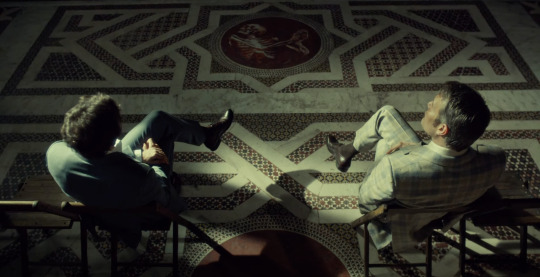


Claudia Durastanti, Strangers I Know / NBC’s Hannibal (2013-2015)
"Every crime of yours feels like one I am guilty of. Not just Abigail's murder, every murder stretching backward and forward in time. Freeing yourself from me and me freeing myself from you, they are the same. We're conjoined."
#pluto dont make every piece of media you consume about hannibal challenge failed#reading this book for my literary studies course#couldnt stop thinking abt these excerpts#pluto web weaves#nbc hannibal#hannibal lecter#hannibal#will graham#the wrath of the lamb#hannigram#hannibaledit#claudia durastanti#strangers i know
1K notes
·
View notes
Note
was thinking about this earlier but the dynamic of cannibalism being associated with high society and the culinary elite (hannibal comes to mind specifically) while also simultaneously being associated with the socially isolated and economically impoverished (as in texas chainsaw massacre) is so interesting to me i want to read 10 million books on why it happens so much in media....
i can only speak from a place of personal opinion and general knowledge, because i haven't read that many papers or in-depth studies on cannibalism, but i think it often comes down to an interesection between the themes of the story you're telling and class structures and divisions. cannibalism is a compelling form of narrative symbolism because it's undeniably impactful and hard to ignore. when portrayed as a practice associated with the culinary and social upper class, it might be used as a critique of the rich and powerful and their lack of ethics and willingness to consume and destroy others for their own self-interest by showing them literally preying on and consuming their victims, or a horror story/cautionary tale about how having everything can lead you to never be satisfied and turn to increasingly extreme measures to feel like life is worth living, or a dark fantasy of indulgence and excess. when associated with the poor, marginalized and isolated, it's often based in bigotry and harmful stereotypes of the "primitive" "inhuman" "savage" "other", however it might also function as a revenge fantasy where the most oppressed and exploited members of society turn on their oppressors and take "eating the rich" to its most literal extreme, exposing the fragility of class divisions and pointing out that those in positions of social and economic power are hardly the mythic titans their propaganda tries to make them out to be, but ultimately just as mortal and made of flesh and blood as any other human being, and not immune to being dragged down from their position at the top of the food chain and torn to pieces by the crowd (as well as reminding the audience of their own fragile mortality and precarious position in the social order, and the humanity we all share in common - however cannibalism often divides the perpetrators from both their victims and the audience, so this is rarer than the other interpretations mentioned).
cannibalism and power often go hand in hand. cannibalism has historically been used as both a means of displaying your power over defeated opponents and delivering a final, humiliating blow to their image by consuming their flesh, and a means of othering and dehumanizing your opponent by portraying them as the cannibalistic monster.
both the very rich and very poor also tend to be perceived as more distant from the people who make and consume these stories, making them easier to project fiction onto and transform into symbols and narrative devices (or, in the worst cases, dehumanize) than those who occupy the same social spheres as the creator. they can be held at an arm's length without discomfort and, depending on the target audience, may be a source of fascination due to the differences in their lived experiences. it adds to the fantasy, and makes any inaccuracies, exaggerations and fabrications feel more plausible because the majority of the audience probably don't have any personal experiences of being in those positions to draw on.
#cannibalism#classism#like this is literally just my interpretation based on my knowledge of media studies literary analysis and sociology#i cant say with any certainty whether its a True and Accurate assessment
2K notes
·
View notes
Text
Critical Role's Cameraman
So, Critical Role (@criticalrole) just released their newest opening title sequence, an animated sequence in the same style of Your Turn To Roll and I would be remis as a film nerd to not pick apart every detail.
What fascinates me about this introduction, however, is the camera movement and shot composition. Allow me to explain.
I DONT THINK THERE ARE SPOILERS AHEAD, BUT JUST TO BE SAFE

So, we open with a hand, this is a close up, I don't think that is unobvious.
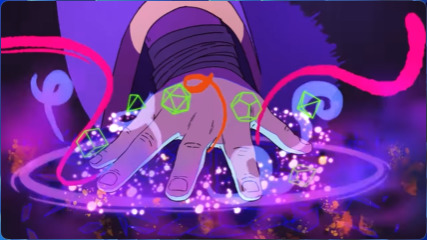
But this stops being a close up rather quickly, before it starts moving away. The shot just gives the hand context, and suddenly you aren't in an extreme close up of a hand, you are in a medium shot of a very large person. Then the camera pans backwards, and you can see villains and places spring up, although the perspective on Matt remains weird. Is he a few metres from you, or a hundred? How big is the Game Master here? There's a sense of mystery, of incomprehension. This is setting up some cosmic horror shenaniganry.

Then, we get Fearne. This is a wide camera motion, swivelling around her in a tracking shot that focuses on her face, and those eyes. It is like a reverse panorama, where Fearne is taking in the world, the world is observing Fearne.
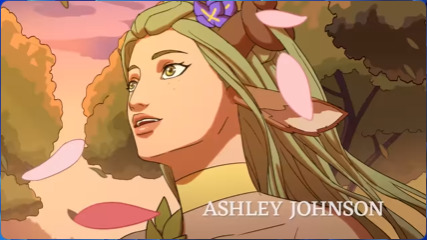
But I want you to take note of the leaves here, because they are used to form a connection between her and Orym. The transition uses them, while it isn't a direct wipe transition (the leaf just flies close to mask an abrupt cut), it is framed as one. The name of that isn't important, though, what's important is the leaves. By being in both shots, they emphasise the relationship between the two characters. But where for Fearn they show off her sense of wonder, for Orym, they take on a very different meaning.
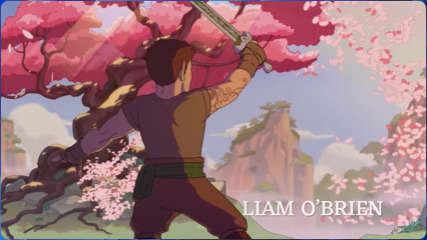
Notice, however, how still this shot is. There is no sense of danger here. This is a scene of a warrior with a sword and two people passing on from this world. But it's calm. Because this is a memory. Orym might not be at peace with the death, but the memory isn't a violent one, it's a memory of his family's lives.
Cut to a close up. Orym creates a gust of wind.
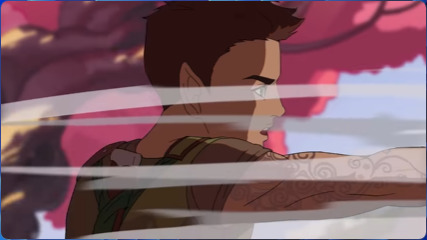
And cut to the next shot.
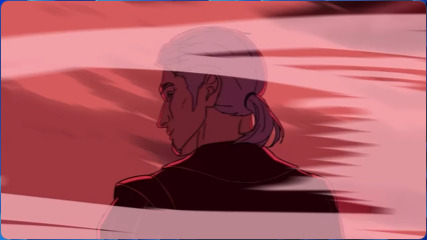
I will not lie, Bertrand is my favourite character across all of Critical Role, so this shot of him made me smile, but it isn't the point here. The point is Imogen's introduction.
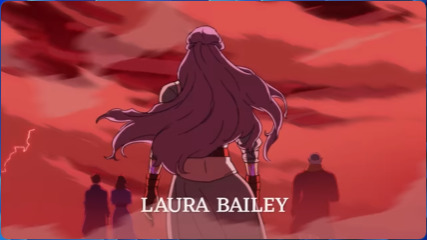
Although is Bertrand not actually the point? Because take a look at how Imogen is shown here. Do you notice anything?
She's shown in the exact same way. Imogen is shown doing the exact same thing that those who have died have done. And she can see them ahead of her. The camera panning back shows a wider perspective here, showing her as she tries to run, tries to get away from the same path as Bertrand.
The wind from Orym's blade that came to this scene gets across a consistent element: Memory. This is a dream. But dreams can become nightmares.
As Imogen loses her footing, the camera gives some of its wildest movements yet. It tumbles around her, then looks up.
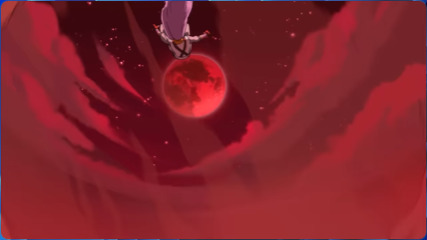
The camera stops moving when it sees the red moon, because now the viewer has something to orientate themselves around. There is a constant point, and we can see Imogen falling down. And getting closer, and closer, and closer, until.
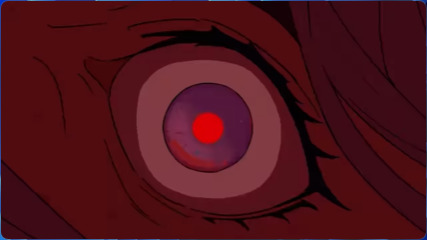
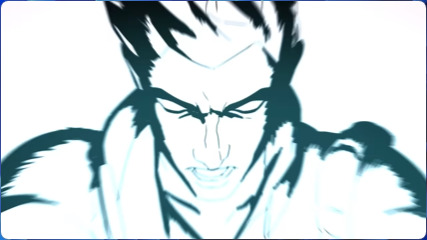

These are the three frames in order, there is nothing in between.
Imogen crashes into the screen, and we get an abrupt impact frame (that's the black and white one) then Ashton. This is so cool to watch, in my opinion, but it is quite possibly the opposite of smooth in camera work. So why is it so cool? Motion.
The motion is in towards Imogen and out away from Ashton. They are both falling, just in different directions. And the impact frame both helps smooth over and accentuate the abrupt transition.
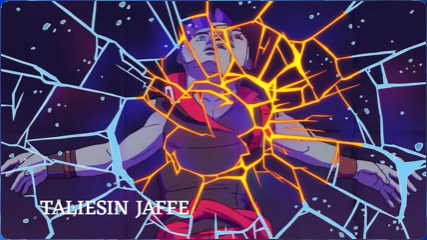
The camera around Ashton is a tracking shot. They are falling, but they remain the exact same in the screen (shrinking slightly). The rest of the world moves. And when Ashton lands, the screen cracks. The tracking shot is used to show Ashton's disassociation with their surroundings. Not in a "I feel nothing" type of way, but in a "it's me vs the world" type of way.
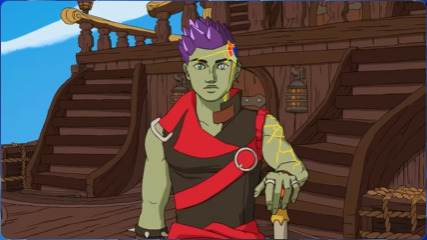
Then, there is an abrupt cut away. Nothing hides or smooths this at all, because Ashton's memory isn't smooth, and neither is Ashton. Remember the disassociating thing I mentioned, now it changes again to someone who gets lost in his thoughts. Medium.com calls this an "anxiety stare" and as someone who does that on the regular, I can attest to this abruptness being exactly what that feels like.

I'm not going to talk too much about the ship, but just be aware that there is a Dutch angle (the horison is diagonal) here to heighten the stress of it.
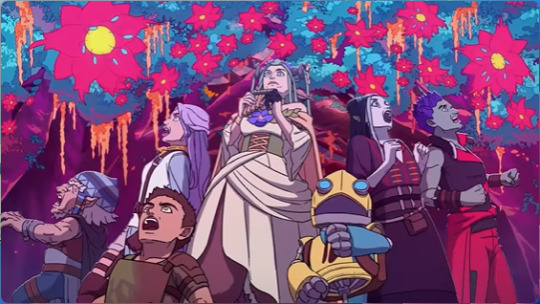
Likewise with this shot, there isn't much to talk about. The slow outward zoom and triangular composition are neat, and the tiered reactions (bottom row reacts, then middle, then Fearne) are amusing, but other than that, not much.
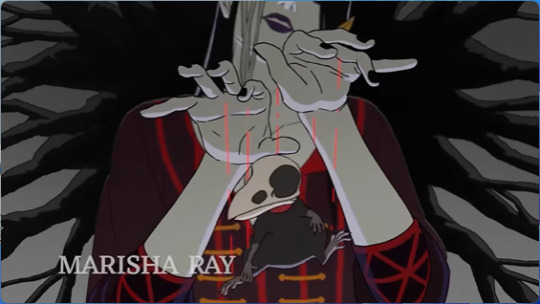
Then we meet Laudna, playing with Pate and giving him life. That's a neat little shot, I wonder if there's a metaphor there.
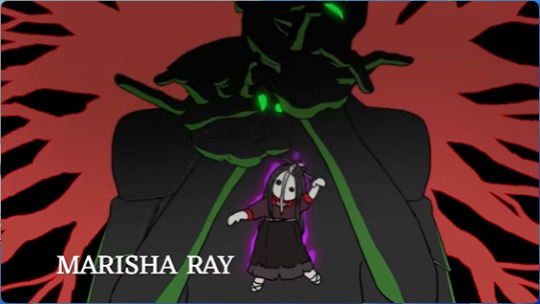
Oh.
This is a super cool visual because it establishes exactly who this character is in two seconds. But I also want to point out the symmetry of this. The hair becomes the blood which becomes the hair again, and then the tree.
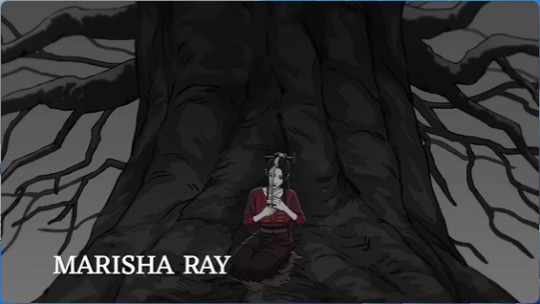
Laudna is introduced as big and scary and imposing, and that is very intentionally undercut by making her look small.
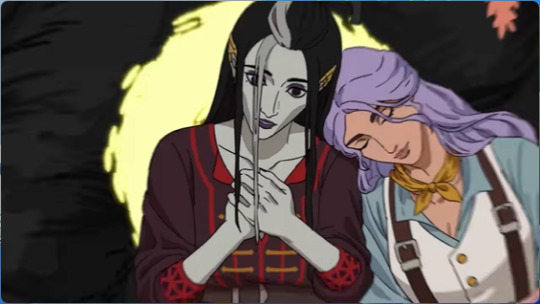
Being small means you are less likely to be the focal character, so shrinking Laudna takes away her agency. Only to give it back through Imogen, and when the camera pans back outwards, Laudna is the same size, but the colours and the surroundings make her feel less alone, and as a weird result of that, less small.
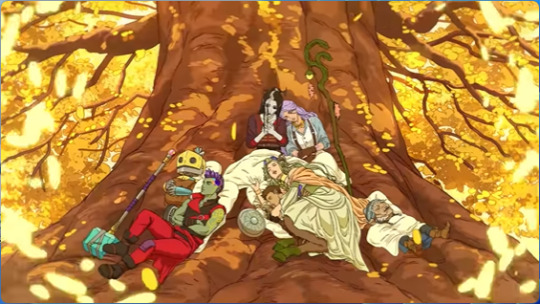
And last but not least in this moment, there is the delayed drop of the hands. Laudna finally feels safe and finally breathes a sigh of relief.
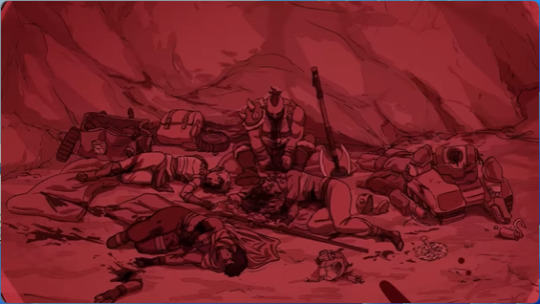
That, however, imediately match cuts to this. FCG's vision. The red tinting has obvious implications that I don't need to explain, but the match cut heavily implies a connection between this group and the Bells Hells. There is a fear that this might happen again made clear by a single transition.
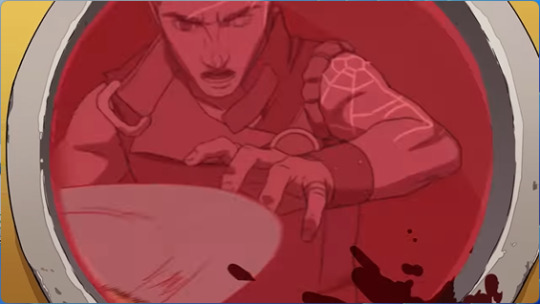
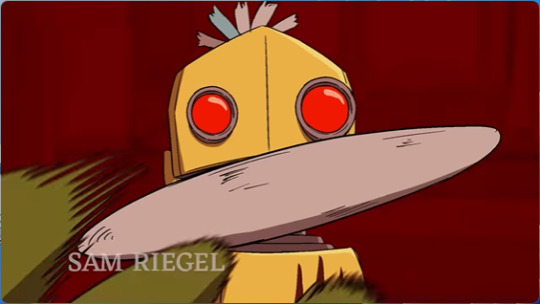
Here's something else. FCG doesn't move. At least, the camera doesn't treat them as moving. It's a slow panning out as if nothing is happening. It's the disassociation vibe that you get from Ashton's falling shots now repurposed to someone who isn't in control of their own actions. This is what FCG is afraid of, this is the important pieces of his character. This is FCG.
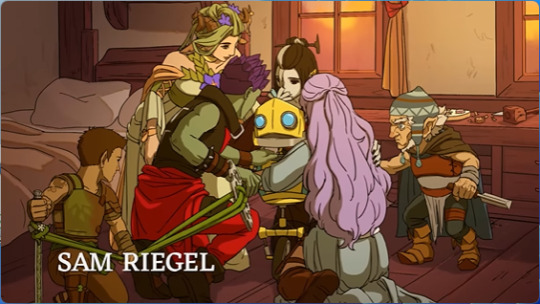
And just like Laudna, FCG finally gains agency when surrounded by their friends who hug them, and FCG finally moves.

Chetney Pock O'Pea, outlaw of the RTA, alpha of his own heart. A fundamentally chaotic character who takes rules as suggestions to be intentionally ignored. A man who's first instinct upon meeting you is to consider how you could be killed. And he is introduced whittling, with a steady camera and warm light illuminating his face. This is a peaceful side of Chetney, there is a duality to him.


Speaking of which, notice how Chetney draws back from the light as he transforms. His eyes begin to glow, but they don't illuminate him, until this:

Chetney is now backlit by the cold light of the moon itself (There's a neat reveal of Ruidus caused by the pan, but that's only tangentially relevant). Notice how much further you are from him here than in his first shot. But notice how much of him is visible, and how much of the screen he takes up. It's the same, this is still the same character. It's a true Doctor Jeckyl and Mr Hyde character. This isn't split personality, but a character who can be a different person in each form, while still remaining Chetney at all times.
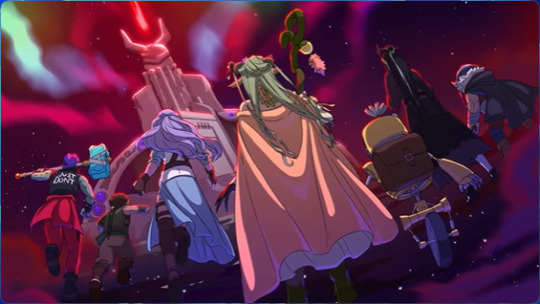
There is more in this video. I encourage you to watch it, but unfortunately, Tumblr has a limit on how many images I can include, so I will leave you with this final shot. A group of heroes looking up at a threat that is so much bigger than them, a threat that is literally controlling the light. But the Bells Hells are closer to the camera, they take up more of the screen. The battle isn't lost, instead, it is just starting.
#rants#literary analysis#literature analysis#media analysis#critrole#critical role#bells hells#imogen temult#laudna#ashton greymoore#fcg#orym of the air ashari#fearne calloway#chetney pock o'pea#its Thursday night#critical role bells hells
518 notes
·
View notes
Text
to summarize an unduly rambly post: our control over kris has been steadily growing more and more distressing for them throughout the story. the snowgrave route, possibly the most gut wrenching, violating imposition of our will on theirs AND Noelle's (*homer voice* so far!), explicitly, thematically, and visually represents possession and coercion through romantic imagery, specifically rings and weddings. it's nauseating. it forces both of them into an implied relationship that neither of them is comfortable in by leveraging noelle's desperate wish to reconnect with her childhood friend. it has exactly the horrible connotations you don't want it to have.
ralsei being presented as both a direct callback to asriel—both the undertale asriel we know, and y'know... kris' brother in deltarune—while also setting him and kris up in a clearly romantic context that kris does not seem to either share or be comfortable with, is not a coincidence. it's not an accident. "isn't that a little incestuous" that's the point! kris' agency being stripped away is one of deltarune's main thematic cores: the game is repeatedly setting up a pattern where that theme is reinforced by putting kris in upsetting, unwanted romantic relationships for OUR entertainment. nothing fits the bill better than pairing them with the nostalgia bait companion that literally looks like their brother.
#incest mention#I'm sorry your only experience with incest as a literary topic has been the skeleton brothers lightsaber-fighting with neon colored dicks#but it's almost like delicate & upsetting topics can be used to have thematically relevant and also upsetting narrative functions#yes! on YOUR computer! it's more likely than you think#not all media is meant to be escapism not all media is made to make you feel good#certainly not one that calls the player's actions and presence into question like DR#deltarune#kris#noelle#ralsei#yeah I'm tagging this one it's just straight up good analysis#entry log#metanalysis
391 notes
·
View notes
Text
emma is the villain of tgwdlm
I need to talk about this oh my god
because it's told from the hive's perspective. paul is the protagonist because he is the one who resists them but must ultimately come to accept that they're right. emma is the one who must be beaten through force.
the difference between the hero and the villain is that the hero must change, while the villain cannot. (I'm not speaking in universals here, just generalizations of how the narrative structures work that tgwdlm uses in parody.) the hero and the villain both hold a belief that represents the thematic evil; by the end of the story, the hero must undergo apotheosis, which is to say, ultimate unity with the thematic good. once this is achieved, he can defeat the villain, who represents the thematic evil completely and is incapable of change.
to the hive, "good" is unquestioning conformity to the group's ideals, specifically, singing and dancing in sync with everybody else. "evil" is refusing to sing and dance along when, clearly, you want to.
paul is the perfect protagonist because he resists song and dance, but largely because it makes him uncomfortable. getting out of your comfort zone is necessary for change! it's a good thing to let yourself go through something uncomfortable in order to come out the other side better and stronger for it. (that much is true; however, sometimes discomfort is a legitimate sign that you should stay away from something.) paul has never really tried singing or dancing, and deep down, is afraid that if he tried it, he might like it. exactly the sort of person who can be converted and used as a shining example of the hive's righteousness.
emma must be the villain because her refusal to fall in line is a choice. she can sing, she can dance, she was in brigadoon in high school and she fuckin killed it, she is even taught a whole ass song with choreography by the hive on their first morning in hatchetfield (emma's comment about how they have to sing "all the time, apparently!" and zoey's implied presence at the theater when the meteor hit - because she was with sam, and sam was there - strongly suggests that nora and zoey were zombified all morning and she had no idea). it's stated by hidgens and suggested by nora and zoey that getting a human to sing/dance along with them is supposed to be a sort of mesmerizing tactic that the hive uses to start synchronizing a person to the hive mind, but emma refuses. she sings and she dances, just like they want, but she chooses to actively hate it the whole time, on principle. she can't be convinced; they have to swarm her, surround her on all sides. let it out is meant to win paul to their side; inevitable is just to gloat.
in the bar scene in hidgens' bunker, emma says that she must be the villain to paul's hero because she was in the musical that got him to hate musicals. on the one hand, she had it backwards; she's the villain because according to the hive, the all-encompassing narrative power, he's not supposed to hate musicals. on the other hand, she's kind of right: paul is the protagonist because he is the guy who didn't like musicals, while emma is the villain because she has the capacity to like musicals as well as experience in them, but has chosen to reject them.
who is the hero and who is the villain all depends on who is telling the story. and the hive is telling this story. don't forget that.
#starkid#team starkid#the guy who didn't like musicals#tgwdlm#media analysis#literary analysis#hero's journey#tgwdlm emma#tgwdlm paul#emma perkins#paul matthews#lauren lopez#jon matteson#nick lang#matt lang#jeff blim
310 notes
·
View notes
Text
Pros of reading authors you don't agree with:
You can make informed rants about how wrong they are.
A+ practice for learning to read texts critically and thinking for yourself, even among people you do agree with.
Occasionally, begrudgingly, they may have a point.
Even if they don't, being able to articulate why helps you understand your own beliefs and spot errors in your thinking.
You'll be much more persuasive to the other side if you understand their arguments and aren't just making assumptions based on what you've heard from others.
Academic drama is incredible.
180 notes
·
View notes
Photo
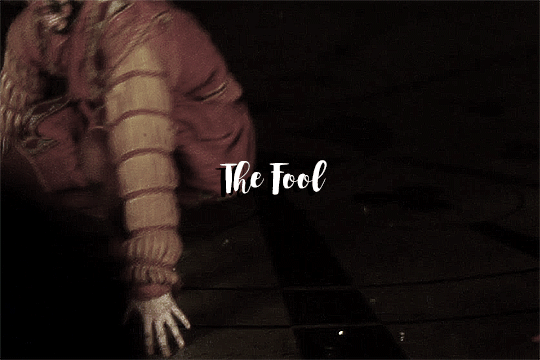
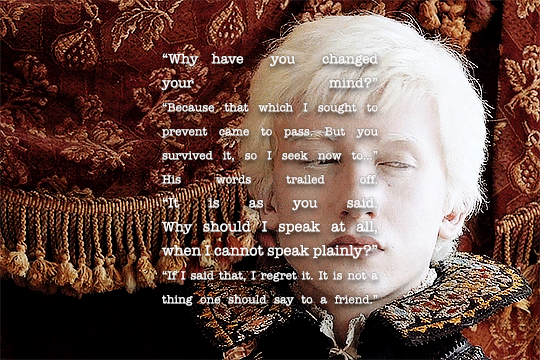
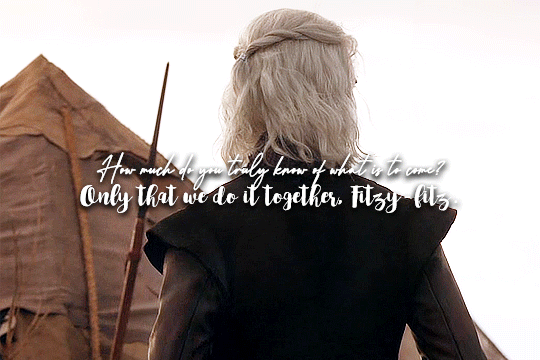

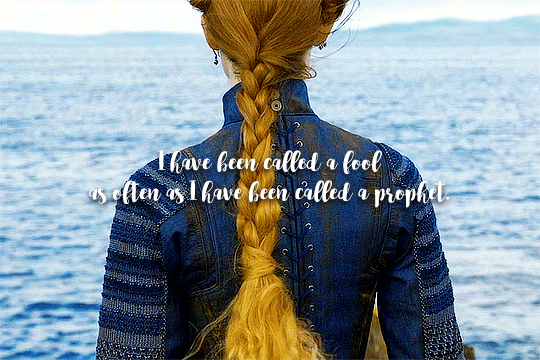
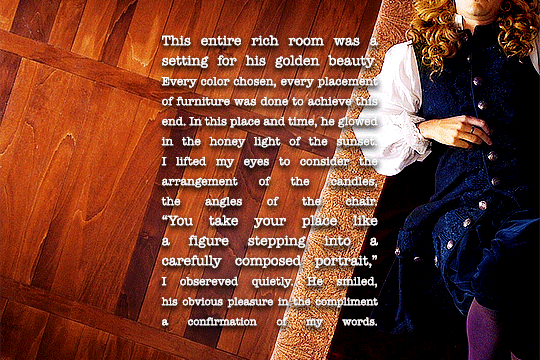
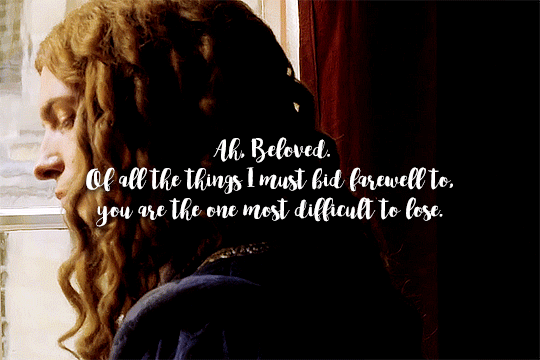
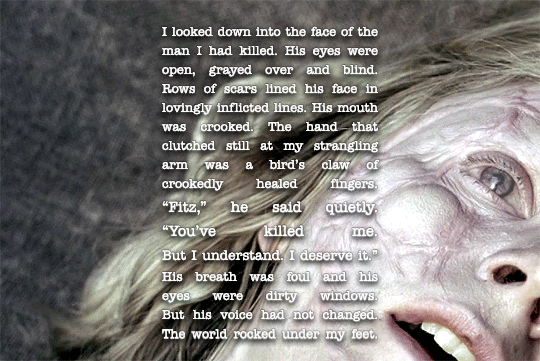
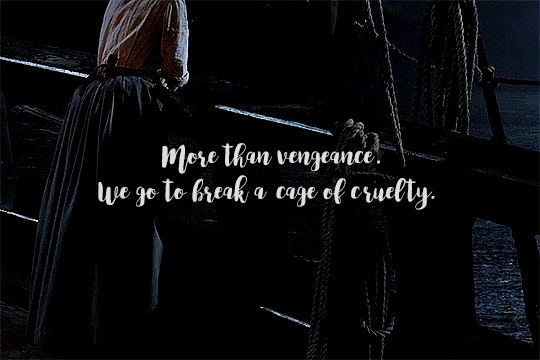
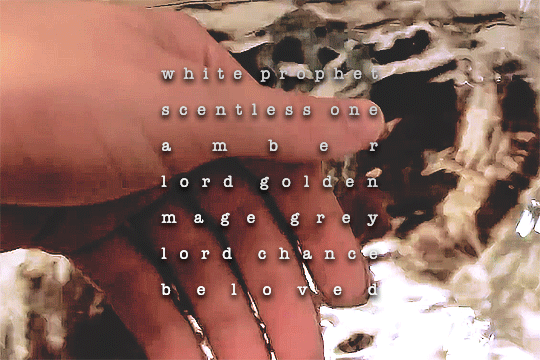
ROBIN HOBB’S REALM OF THE ELDERLINGS
>> The Fool
The Farseer Trilogy + The Liveship Traders Trilogy + The Tawny Man Trilogy + The Fitz and The Fool Trilogy
You know who I am. I have even given you my true name. As for what I am, you know that, too. You seek a false comfort when you demand that I define myself for you with words. Words do not contain or define any person. A heart can, if it is willing. But I fear yours is not. You know more of the whole of me than any person who breathes, yet you persist in insisting that all of that cannot be me. What would you have me cut off and leave behind? And why must I truncate myself in order to please you? I would never ask that of you.
#rote spoilers#realm of the elderlings#roteedit#bookedit#fantasyedit#the fool#the farseer trilogy#the liveship traders#the tawny man trilogy#the fitz and the fool trilogy#made by carolyn#the main reason i think there should be no actual rote adaptation is because it would be impossible to cast this character!#every gif here is from a different piece of media :)))))#i just hope it's cohesive to people other than myself because boy i tried!#like the whole point is that this character is passable as different people to pretty much everyone but fitz so#we're living with it :)))#anyway here's an ode to my genuine favorite literary character please give beloved a round of applause <3333
291 notes
·
View notes
Text
You know, lately I find little joy in reading media discourse. I love media analysis, I studied it, I taught it, but lately I just don’t enjoy reading people’s thoughts like I once did.
It’s not just that media literacy and reading comprehension are in decline, that’s been going on for a while. It’s that so much of media discourse feels like a phantom war, a proxy for something else. It’s not even about the media anymore.
People find one flaw and judge it an irredeemable one so they can dismiss something they were always going to dismiss because of the theme, the subject matter, the person behind it etc. People dismiss a piece of art that is about x for not being about y (people wanting every story to indirectly be about them etc.) People dismiss pieces of art for not condemning their own characters for not being morally virtuous, not condemning their own themes for being limited, not condemning their own creation for being insufficiently radical or revolutionary.
It’s like so many people will just say stuff completely disconnected from the reality of creation under capitalism, completely indifferent to authorial & historical & geographical context, genre, subtext, logistics etc.
It’s not enough to say that a work has flaws and explain why and what that reveals. The flaws must be irredeemable blemishes that besmirch the moral character of the creators and audience. It is not treated as expression. It is treated as a calculated move in the battle of ideas and must be lambasted or praised not on the basis of artistic merit or analytical potential, but on its position within the discourse.
Media & art themselves are seen as allies or enemies to social and political causes and their evaluation is a strategic manoeuvre to gain clout for or against certain causes or ideas.
I just think it’s a shame. All art is political. All analysis is political. But the way interpretation is taking a back seat to propagation is troubling. It decentralises the art and forefronts the viewer, deprioritises questions of meaning over questions political usefulness and salience. Ultimately, it diminishes actual analytical and argumentative skills and massively proliferates bad faith arguments, confirmation bias, rhetorical tricks and propaganda tools.
I think this kind of approach will not work out well, will only lead to more alienation and polarisation, and will ultimately exacerbate the devaluation of any art and any analysis that it is deemed irrelevant to mainstream identity groupings or insignificant to mainstream social and political causes. This will not end well.
If we cannot value art that is not of use to us or about us then we cannot appreciate most of artistic history. If we do not value stories because they ostensibly don’t relate to our own, how can we ever learn to see past difference and choose empathy over antipathy?
This will not end well.
#media analysis#media literacy#interpretation#reading comprehension#analysis#literacy#literary discussion#literary analysis#anti intellectualism#barbie#oppenheimer#barbenheimer#oppenbarbie#discourse#media discourse#media discussion
598 notes
·
View notes
Text
nvm this is still on my brain. kim does not like to watch harry suffer… to say that kim takes satisfaction in harry’s pain is a huge misconstruing of his character.
the “getting thrashed like a schoolboy” line comes from a board game, lol. it’s a tease, not a cruelty. there’s never any line that implies that Kim enjoys seeing Harry taking actual morale damage.
he can be amused if you fail a check, but the check is always relatively inconsequential, and again, Harry isn’t taking damage in these.
Failing to pry the trash bin open:

Failing to shatter Ruby’s lorry window:

(also in both of these examples he only responds smugly if you choose for Harry to stubbornly dig in his heels. if Harry gets huffy, Kim teases. If Harry backs down right away Kim won’t rub it in, which feels significant to me! it reminds me of that recent post goin around about Kim meeting your energy!)
and here’s some reactions to failed checks where he does take damage.
Failing the jump to get your cloak:

Failing to break down Plaisance’s door:

he’s not laughing if Harry’s taking damage because he’s not a dick lol.
aaaaand here’s some other instances of morale/health damage and kim’s reactions.
alternate dialogue for failing the harbor jump:
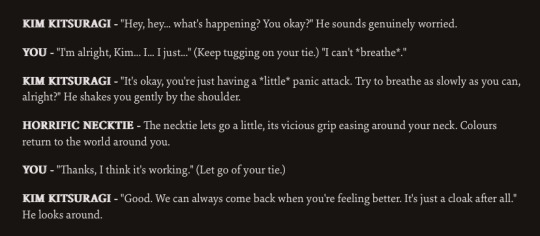
after the call with precinct 41:

seeing bullet holes in the wall:
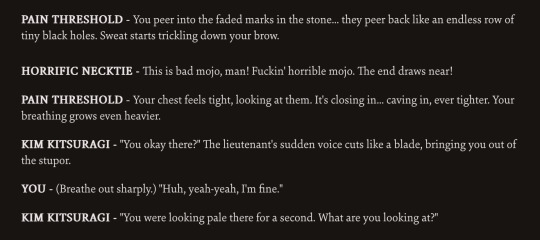
most significant examples to argue this point for me come when harry has done something to jeopardize the RCM’s image. which kim goes on and on about the importance of maintaining— and yet even here, he still extends worry and assurance.
telling Billie about her husband and handling it badly:
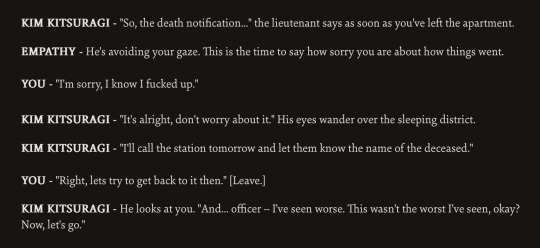
hardie authority check failure cock carousel:
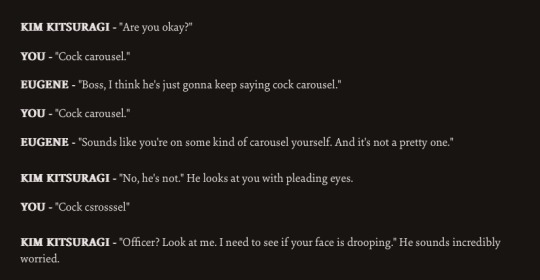
aaaaand the car. this line is one of the most mask-off kim moments we get in the game in my opinion, honestly.

tying this back to the schoolboy line— that line doesn’t show up if you have a negative reputation with Kim. if you have <1 rep, it gets replaced with him calling it “about four hours of our lives that we'll never get back,” lol.
it’s affectionate ribbing!! twisting it into anything else is bizarre 2 me lmao!
anyways. kim is a foil to every other cop we meet in the game specifically because he doesn’t view harry as a punching bag or a lost cause. gottlieb does nothing but sling jabs and glib jokes about harry’s health. torson+mclaine and the others laugh at harry’s panic attack over the radio. in response to harry’s suicide-by-car attempt(!!!!) jean yells about RCM budget. all kim’s lines in response to harry’s check failures and health-damage are consistent, explicit textual contrast against the callousness of the rest of the RCM. twisting kim’s character here requires a bad faith interpretation of the whole game.
#disco elysium#kim kitsuragi#sometimes i think that fandom Hot Takes get posted just for the sake of contrasting with the majority interpretation of the media#which can be fun lol. i personally love being a pretentious contrarian when the shoe fits.#keyword when the shoe fits#sometimes it just comes off as#the thing where positive interpretations of the thing are somehow seen as lesser or naive#which i feel is so antithetical to DE’s core philosophy#it’s not naive to interpret a hopeful story as hopeful#it’s not naive to interpret a kind character as indeed kind#kindness has as much literary value as cruelty in storytelling#overcorrecting for the sake of overcorrecting in this case just feels very. meanspirited#i don’t want to come off as antagonizing because we are all just posting about a video game on tumblr dot com at the end of the day#it’s okay to Have Differing Opinions On Media#but like. there’s a reason the post Did Not Resonate lol#oh also if anyone has a link to the other post i referenced i’d love to link it in the post properly i just couldn’t find it </3#me talking
832 notes
·
View notes
Text
On the one hand, it's true that the way Dungeons & Dragons defines terms like "sorcerer" and "warlock" and "wizard" is really only relevant to Dungeons & Dragons and its associated media – indeed, how these terms are used isn't even consistent between editions of D&D! – and trying to apply them in other contexts is rarely productive.
On the other hand, it's not true that these sorts of fine-grained taxonomies of types of magic are strictly a D&D-ism and never occur elsewhere. That folks make this argument is typically a symptom of being unfamiliar with Dungeons & Dragons' source material. D&D's main inspirations are American literary sword and sorcery fantasy spanning roughly the 1930s through the early 1980s, and fine-grained taxonomies of magic users absolutely do appear in these sources; they just aren't anything like as consistent as the folks who try to cram everything into the sorcerer/warlock/wizard model would prefer.
For example, in Lyndon Hardy's "Five Magics" series, the five types of magical practitioners are:
Alchemists: Drawing forth the hidden virtues of common materials to craft magic potions; limited by the fact that the outcomes of their formulas are partially random.
Magicians: Crafting enchanted items through complex manufacturing procedures; limited by the fact that each step in the procedure must be performed perfectly with no margin for error.
Sorcerers: Speaking verbal formulas to basically hack other people's minds, permitting illusion-craft and mind control; limited by the fact that the exercise of their art eventually kills them.
Thaumaturges: Shaping matter by manipulating miniature models; limited by the need to draw on outside sources like fires or flywheels to make up the resulting kinetic energy deficit.
Wizards: Summoning and binding demons from other dimensions; limited by the fact that the binding ritual exposes them to mental domination by the summoned demon if their will is weak.
"Warlock", meanwhile, isn't a type of practitioner, but does appear as pejorative term for a wizard who's lost a contest of wills with one of their own summoned demons.
Conversely, Lawrence Watt-Evans' "Legends of Ethshar" series includes such types of magic-users as:
Sorcerers: Channelling power through metal talismans to produce fixed effects; in the time of the novels, talisman-craft is largely a lost art, and most sorcerers use found or inherited talismans.
Theurges: Summoning gods; the setting's gods have no interest in human worship, but are bound not to interfere in the mortal world unless summoned, and are thus amenable to cutting deals.
Warlocks: Wielding X-Men style psychokinesis by virtue of their attunement to the telepathic whispers emanating from the wreckage of a crashed alien starship. (They're the edgy ones!)
Witches: Producing improvisational effects mostly related to healing, telepathy, precognition, and minor telekinesis by drawing on their own internal energy.
Wizards: Drawing down the infinite power of Chaos and shaping it with complex rituals. Basically D&D wizards, albeit with a much greater propensity for exploding.
You'll note that both taxonomies include something called a "sorcerer", something called a "warlock", and something called a "wizard", but what those terms mean in their respective contexts agrees neither with the Dungeons & Dragons definitions, nor with each other.
(Admittedly, these examples are from the 1980s, and are thus not free of D&D's influence; I picked them because they both happened to use all three of the terms in question in ways that are at odds with how D&D uses them. You can find similar taxonomies of magic use in earlier works, but I would have had to use many more examples to offer multiple competing definitions of each of "sorcerer", "warlock" and "wizard", and this post is already long enough!)
So basically what I'm saying is giving people a hard time about using these terms "wrong" – particularly if your objection is that they're not using them in a way that's congruent with however D&D's flavour of the week uses them – makes you a dick, but simply having this sort of taxonomy has a rich history within the genre. Wizard phylogeny is a time-honoured tradition!
#gaming#tabletop roleplaying#tabletop rpgs#dungeons & dragons#d&d#worldbuilding#taxonomy#phylogeny#media#literature#history#literary history#death mention
3K notes
·
View notes
Text
I know the average reading comprehension on this site is zero but I'm different. I'm applying wildly inappropriate analysis lenses to popcorn media. I'm doing a queer theory reading of Horus Heresy novels. Now I'm doing feminist analysis of Warhammer 40k canon. Now I'm applying Marxist analysis to The Outsiders. Time for a historical analysis of The Locked Tomb. A post-colonial reading of the entirety of Doctor Who. A psychological anlaysis of Twilight. On the horseshoe scale of reading comprehension I'm at "so much reading comprehension that it loops back around to not understanding books at all actually". You can't stop me. I'm literary analysis Georg
#I paid many thousands of dollars for this degree#and by god i will use it#literature#Literary analysis#Literature analysis#Media analysis#literary criticism#reading#reading comprehension#meta analysis#literature major#literature memes#lit crit#media literacy
336 notes
·
View notes
Text
Actual Conversation In The Book Mockingjay
Hijacked Peeta: You're short and plain looking lol.
Katniss: *knows she shouldn't say what she's about to say*
Katniss: You've looked better yourself.
Peeta: That's not very nice to say to me when I'm like this.
Katniss: You're the nice one, not me.
#the hunger games trilogy#the hunger games#hunger games#books#mockingjay#literature#book analysis#media analysis#media commentary#character analysis#character dynamics#peeta mellark#katniss everdeen#everlark#katniss and peeta#katniss x peeta#funny#hijacked peeta#character appreciation#literary analysis#humor
155 notes
·
View notes
Text
To want or expect a character or narrative to be perfectly moral and sound (by your own standards) in every decision they make with no regard to their own background or the tools (or lack thereof) they have at hand, merely because you have the tools yourself and expect it to be simple for everyone else using their bare, bloody hands, is to have a fundamental misunderstanding of not only the point of most fiction but also life itself.
#yes i'm still on about something someone said to me#uh send textpost#media#media analysis#on writing#ish#textpost#movies#tv shows#books#critical thinking#literary analysis#fandom
114 notes
·
View notes
Text
There are too many people who, upon encountering a woman character with too many specific traits and flaws established, lose the ability to identify with them and turn to secondary, less active, less developed characters that they can more easily project into.
As in, they'll reframe the whole story in their head and insist the true protagonist is a secondary or tertiary character. That the original protagonist is a 'Mary Sue' not worth regard. And it's weird because so often women characters are also criticized and labelled as Mary Sue's for the opposite reason as well.
I do not mean said secondary/tertiary character is bad or uninteresting. I simply mean it's inaccurate to frame them as the protagonist, and I do often see said characters proclaimed to have traits they don't possess (often traits taken from the protagonist).
It's a phenomenon not restricted to women, but I have noticed it's more common with women. For some reason they rarely do this to the men of the story. And I feel like there's some internalized misogyny in there.
I see it on both the audience end and occasionally even the writer's end. *cough* The Vampire Diaries *cough*. For now, I'll call it the Trapped in a Island with Josh Hutcherson phenomenon where Jenny Nicholson points out that the author wrote a self-insert, got jealous of the self-insert when she took on too much of a life of her own, and proceeded to write a new self-insert to push the old one aside.
Some examples:
Rhaenyra → Alicent, Helaena, and occasionally Baela & Rhaena (might also be some ageism in there too)
Arya & Dany → Sansa, the Dead Ladies Club, Brienne on occasion
Elena Gilbert (TVD) → Caroline Forbes
Those are the most blatant examples, but I swear this phenomenon is EVERYWHERE.
Anyways, I'm looking for more specific examples so I can better look into it. If you can think of another one, do me a favour and drop it below!
#hotd#hotd critical#hotd fandom#asoiaf#asoiaf fandom#daenerys targaryen#arya stark#the vampire diaries#julie plec#trapped in a island with josh hutcherson syndrome#media analysis#literary analysis
97 notes
·
View notes